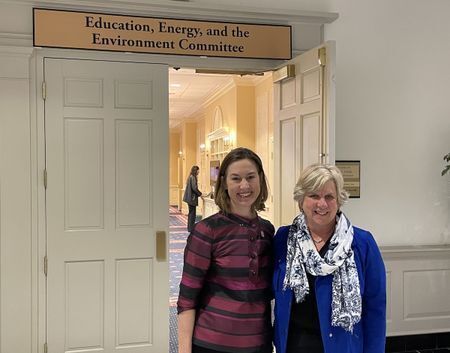NCF Support of Maryland Cyber Bills

MD Senator Katie Fry-Hester with NCF President & CEO Laura Nelson
In March 2023, NCF President & CEO Laura Nelson testified before the Maryland State Legislature, in Annapolis, in support of two cyber bills re-introduced by Senator Katie Fry-Hester (Legislative District 9). Senator Hester is also the Senate Chair of the Joint Committee on Cybersecurity, IT, and Biotechnology.
Testimony in Support of SB801
On March 7th, Ms. Nelson testified before the Senate Finance Committee on Senate Bill 801, entitled: Economic Development -Cybersecurity – Cyber Maryland Program. If passed, SB801 would establish a Cyber Maryland Program in the Maryland Technology Development Corporation (TEDCO) to create a talent pipeline in cybersecurity, serve as a hub for State workforce development programs in cybersecurity, and coordinate cybersecurity, research, and innovation in the State. The bill also creates the Cyber Maryland Fund as a special, non-lapsing fund to be administered by the program.
SB801 establishes the membership of the Cyber Maryland Board, identifies the Board’s specific duties and collaborations with the Maryland Department of Labor (MDL) and the Department of Commerce. Beginning December 1, 2026, the program, in conjunction with TEDCO, must submit an annual report on the operation and performance of the program to the Governor and General Assembly.
In her testimony, Ms. Nelson said, “Establishing a Cyber Maryland program will position our State to increase our cybersecurity workforce, create a talent pipeline, and serve as a one-stop shop for Maryland employers seeking to leverage cyber workforce development, education, and training programs. This center will help build our talent pipeline of all ages, including those just entering the workforce.”
SB801 received full support by the State Senate and passed the legislation, unanimously. The bill received a hearing in the House Health & Government Operations (HGO) on March 29th. Ms. Nelson submitted a letter to the HGO Committee Chair and members expressing support for the bill and urging its passage. SB801 takes effect July 1, 2023, if enacted.
Watch Sen Fry-Hester and Laura Nelson testify on YouTube. Sen. Hester and Laura testimony begins at 27:42.
Testimony in Support of SB799
On March 14th, Ms. Nelson returned to Annapolis to testify before the Senate Education, Energy, and the Environment Committee, in support of Senate Bill B799, entitled: Public Schools – Cyber Safety Guide – Development, Usage, and Reporting.
A similar bill was introduced during the 2022 Legislative Session and received the support of Ms. Nelson and the National Cryptologic Foundation (NCF). Senator Hester refined the bill during the interim. If passed, SB799 would have required the Maryland State Department of Education (MSDE), the Behavioral Health Administration within the Maryland Department of Health (MDH), the Maryland Center for School Safety (MCSS), and the Department of Information Technology (DoIT) to develop and jointly publish a cyber safety guide for public schools by July 1, 2024.
The cyber safety guide must be available by the 2024-2025 school year and contain information and guidance on safe Internet, social media, and technology use for (1) students in pre-kindergarten through grade 12; (2) parents; and (3) school employees who interact with students. It must be developed in consultation with professionals who specialize in child development and child psychology and include age-appropriate information and best practices, as specified.
In her testimony, Ms. Nelson said, “Every day, our youth are at risk as they enter the digital ecosystem. Developing a Cyber Safety Guide and Training Course will equip today’s students to understand the interconnected world around us. This guide will provide students, parents, and teachers with the necessary tools and guidance for safe internet, social media, and technology use. They must understand how to protect themselves and ensure their privacy and security.”
Unfortunately, SB799 failed to receive a vote by the Senate Education, Energy, and the Environment Committee thereby preventing the full Senate Chamber to vote on it before the bill “cross over” deadline on March 20th. As a result, this bill will no longer be considered by the Maryland General Assembly and will have to be re-introduced next year.


